In August of this year, my president, Barack Hussein Obama, wrote:
We need to keep changing the attitude that raises our girls to be demure and our boys to be assertive, that criticizes our daughters for speaking out and our sons for shedding a tear. We need to keep changing the attitude that punishes women for their sexuality and rewards men for theirs. We need to keep changing the attitude that permits the routine harassment of women, whether they’re walking down the street or daring to go online. We need to keep changing the attitude that teaches men to feel threatened by the presence and success of women…And yes, it’s important that [Sasha and Malia’s] dad is a feminist, because now that’s what they expect of all men. (Glamour, August 4, 2016)
Sigh.
This year my Year in Reading selections are themed: fathers and daughters. The topic is close to home: the father-daughter relationships in both my novels — Long for This World and The Loved Ones — are central.
Not all the following fictional father-daughter bonds are as beautiful or evolved as the first family’s, but they are all complex and memorable. These fathers and daughters are flawed, some painfully so, yet there is an honesty and a messy striving in these depictions that I find compelling.
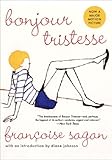 The 1955 novella Bonjour Tristesse — a delicious, devastating anti-coming-of-age tale written by Françoise Sagan when she was 17 years old — tops my list. Cécile (also 17), her father, and his mistress du jour take a villa on the Mediterranean for the summer. In her own words, Cécile’s father Raymond, a 40 year-old widower, is
The 1955 novella Bonjour Tristesse — a delicious, devastating anti-coming-of-age tale written by Françoise Sagan when she was 17 years old — tops my list. Cécile (also 17), her father, and his mistress du jour take a villa on the Mediterranean for the summer. In her own words, Cécile’s father Raymond, a 40 year-old widower, is
a frivolous man, clever at business, always curious, quickly bored, and very attractive to women. It was easy for me to love him for he was kind, generous, gay and fond of me.
Father and daughter are similarly flawed — self-centered, hedonistic, driven too much and too often by a need for “physical charms” at the expense of intelligence or moral depth. Thus Cécile “cannot imagine a better or more amusing companion.” American readers in particular — now as then — will judge Raymond harshly, as indulgent and inappropriate and oblivious to fatherly responsibility. For these very reasons, I confess I find Raymond, Cécile’s relationship with him, and the narrative perspective on both (Cécile’s retrospective but not fully illuminated first-person point-of-view) not just refreshing, but persuasive. In an era of helicopter parenting and an oppressive parenting industry, the absence of all that striving by this duo to be anything but themselves means an implicit bond/trust between them that one can’t help but give its due: it’s them against the world. Both do behave badly, and others suffer seriously as a result. The brilliance of the novel, I think, is its power to reflect back to the reader how much you care about the damage the pair causes versus the assertion of their essential selves. Diane Johnson, in her introduction, implies that the reader unequivocally does, is meant to, read through the narrator — assess her failures from a wiser, morally superior vantage point — and internalize a cautionary tale of weakness of soul. I’m not so sure, myself; ambiguity teems in the subtext, and as far as I’m concerned, herein lies the elegant technical achievement of a prodigy’s debut — the first of Sagan’s 30 novels to come.
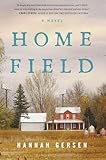 Our own Hannah Gersen’s debut novel, Home Field, shows us just how tragic the unbridgeable gap between a father and daughter can be, when connection is desperately needed and the disconnect no one’s fault. Under the best of circumstances, Dean and his teenage daughter, Stephanie, would fail to connect: he is the high school football coach, a hero in a small town and wholly absorbed in his devotion to his players, while Stephanie doesn’t much care for the sport at all. When Dean’s wife/Stephanie’s mother, Nicole, commits suicide, all bets are off as each family member is sent reeling into remote grief. Stephanie goes off to her freshman year in college, which lets Dean off the hook, sort of. In the short-term he reaches for another woman, as well as a kind of unconscious replacement for Stephanie in his niece. Then, when Stephanie suffers a bad acid trip while at school, and he isn’t home to receive the emergency call from Stephanie’s roommate, Dean’s uselessness comes into stark relief. Gersen doesn’t tidy any of this up easily. Her novel has been compared to the TV series Friday Night Lights, but whereas the show — of which I am a huge fan — leans YA in its goodness-prevails outlook, Home Field allows characters to scatter and come together more quietly: the violent loss hits each family member uniquely, and in the end it’s mere proximity and watchfulness that they can offer one another: “Dean got a glimpse of what [Stephanie] would look like when she was older, and for the first time he could picture her in the world, the adult world.”
Our own Hannah Gersen’s debut novel, Home Field, shows us just how tragic the unbridgeable gap between a father and daughter can be, when connection is desperately needed and the disconnect no one’s fault. Under the best of circumstances, Dean and his teenage daughter, Stephanie, would fail to connect: he is the high school football coach, a hero in a small town and wholly absorbed in his devotion to his players, while Stephanie doesn’t much care for the sport at all. When Dean’s wife/Stephanie’s mother, Nicole, commits suicide, all bets are off as each family member is sent reeling into remote grief. Stephanie goes off to her freshman year in college, which lets Dean off the hook, sort of. In the short-term he reaches for another woman, as well as a kind of unconscious replacement for Stephanie in his niece. Then, when Stephanie suffers a bad acid trip while at school, and he isn’t home to receive the emergency call from Stephanie’s roommate, Dean’s uselessness comes into stark relief. Gersen doesn’t tidy any of this up easily. Her novel has been compared to the TV series Friday Night Lights, but whereas the show — of which I am a huge fan — leans YA in its goodness-prevails outlook, Home Field allows characters to scatter and come together more quietly: the violent loss hits each family member uniquely, and in the end it’s mere proximity and watchfulness that they can offer one another: “Dean got a glimpse of what [Stephanie] would look like when she was older, and for the first time he could picture her in the world, the adult world.”
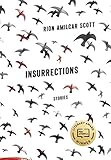 In Rion Amilcar Scott’s “202 Checkmates,” my favorite story from his powerful debut collection, Insurrections, a 12 year-old girl and her downtrodden father find absorption and shared passion in the game of chess: “We both hunched over the board. There was no world outside the both of us, outside of this game.” The layering of a coming-of-age, working-class, black family struggle, and the complicated, aching need children have to both admire and conquer their parents is beautifully done here. The mother character is somehow both backgrounded and heartbreakingly blaring as she whisper-harangues her husband for encouraging their daughter toward chess instead of schoolwork, and for spending money on a marble chess set when he is chronically underemployed. Father and daughter reach together toward something beyond mere survival — toward mental vitality and mastery and delight. The tension that builds toward the story’s end anticipates the reader’s conflicting investments perfectly, and the resolution satisfies just as well.
In Rion Amilcar Scott’s “202 Checkmates,” my favorite story from his powerful debut collection, Insurrections, a 12 year-old girl and her downtrodden father find absorption and shared passion in the game of chess: “We both hunched over the board. There was no world outside the both of us, outside of this game.” The layering of a coming-of-age, working-class, black family struggle, and the complicated, aching need children have to both admire and conquer their parents is beautifully done here. The mother character is somehow both backgrounded and heartbreakingly blaring as she whisper-harangues her husband for encouraging their daughter toward chess instead of schoolwork, and for spending money on a marble chess set when he is chronically underemployed. Father and daughter reach together toward something beyond mere survival — toward mental vitality and mastery and delight. The tension that builds toward the story’s end anticipates the reader’s conflicting investments perfectly, and the resolution satisfies just as well.
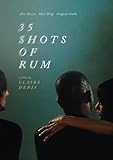 One stunning father-daughter portrayal this year came not through a book but across my screen, via French maîtresse-filmmaker Claire Denis’s 35 Shots of Rum. Here — as in her wonderful earlier film U.S. Go Home, which focuses on a brother-sister relationship — Denis explores her interest in the romantic shades of familial love. Lionel — a widowed métro train driver and West African migrant — and his daughter, Josephine — a university student in anthropology whose mother was German — might be seen as a working-class version of Sagan’s Raymond and Céline: they have a special intimacy, it’s them against the world, and they’re each fearful of imagining life without the other. Unlike their privileged, indulgent counterparts, however, Lionel and Josephine see that they must try harder to connect with humanity, and their own hearts’ desires, beyond the safety of their love. Denis — a master of complex emotional layers in the guise of simple stories — seems to laud that effort while simultaneously rendering its emotional cost and the uncertainty of its result.
One stunning father-daughter portrayal this year came not through a book but across my screen, via French maîtresse-filmmaker Claire Denis’s 35 Shots of Rum. Here — as in her wonderful earlier film U.S. Go Home, which focuses on a brother-sister relationship — Denis explores her interest in the romantic shades of familial love. Lionel — a widowed métro train driver and West African migrant — and his daughter, Josephine — a university student in anthropology whose mother was German — might be seen as a working-class version of Sagan’s Raymond and Céline: they have a special intimacy, it’s them against the world, and they’re each fearful of imagining life without the other. Unlike their privileged, indulgent counterparts, however, Lionel and Josephine see that they must try harder to connect with humanity, and their own hearts’ desires, beyond the safety of their love. Denis — a master of complex emotional layers in the guise of simple stories — seems to laud that effort while simultaneously rendering its emotional cost and the uncertainty of its result.
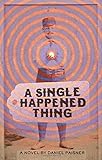 Re: Daniel Paisner’s A Single Happened Thing, published this past spring, I’d like first to set the record straight: despite its cover art and the characters’ extreme passion for the sport, it is not “a baseball novel.” Not solely or primarily, anyway. (Paisner and I share a publisher, which is how I came to read the book, and I’m thankful, since, given its basebally veneer, it may otherwise have passed me by.) Rather A Single Happened Thing is a poignant and whimsical story about a man, David Felb, stalled at middle age, who anxiously doubts then gives himself over to the possibility of a fantastical visitation upon his unremarkable life. The central question Paisner asks via Felb’s story is, What happens when you are carried into a nether realm of anything-goes, and your loved ones are not willing to come along with you? In David Felb’s case, it is his wife, Nellie, who becomes wary of him; but his daughter, 15 year-old Iona, hitches her heart to her father’s leap of faith. Paisner’s novel walks the sad, beautiful line that children walk when they love both parents and know that “sides” are forming; it also allows us to feel for Nellie all that Felb himself feels — love, longing, disappointment. Iona’s evolving originality and girl-power intelligence leap off the page, reminding us that parents often pour the best of their own remarkableness into their children; and that ain’t nothin.
Re: Daniel Paisner’s A Single Happened Thing, published this past spring, I’d like first to set the record straight: despite its cover art and the characters’ extreme passion for the sport, it is not “a baseball novel.” Not solely or primarily, anyway. (Paisner and I share a publisher, which is how I came to read the book, and I’m thankful, since, given its basebally veneer, it may otherwise have passed me by.) Rather A Single Happened Thing is a poignant and whimsical story about a man, David Felb, stalled at middle age, who anxiously doubts then gives himself over to the possibility of a fantastical visitation upon his unremarkable life. The central question Paisner asks via Felb’s story is, What happens when you are carried into a nether realm of anything-goes, and your loved ones are not willing to come along with you? In David Felb’s case, it is his wife, Nellie, who becomes wary of him; but his daughter, 15 year-old Iona, hitches her heart to her father’s leap of faith. Paisner’s novel walks the sad, beautiful line that children walk when they love both parents and know that “sides” are forming; it also allows us to feel for Nellie all that Felb himself feels — love, longing, disappointment. Iona’s evolving originality and girl-power intelligence leap off the page, reminding us that parents often pour the best of their own remarkableness into their children; and that ain’t nothin.
Plus, if the same happens also to apply to Sasha and Malia Obama vis-à-vis their parents’ best, then look out, world: we absolutely do have hope for the future.
More from A Year in Reading 2016
Don’t miss: A Year in Reading 2015, 2014, 2013, 2012, 2011, 2010, 2009, 2008, 2007, 2006, 2005









